Why Do Igbo People Claim Yoruba Words To Be Theirs? - Culture (12) - Nairaland
Nairaland Forum / Nairaland / General / Culture / Why Do Igbo People Claim Yoruba Words To Be Theirs? (67396 Views)
Red Ibo In Jamaica: A Profile Of The Igbo People Of Jamaica / 4 Things Igbo People Like. / Yoruba Words And Phrases That Has Gone Global!!(interesting) (2) (3) (4)
(1) (2) (3) ... (9) (10) (11) (12) (13) (14) (Reply) (Go Down)
| Re: Why Do Igbo People Claim Yoruba Words To Be Theirs? by PreciousBro: 10:56pm On Sep 08, 2016 |
And before i forget, we igbos have more claim to the word over you because by inference to 'onye ibo' to 'oyibo' draws an unavoidable vocal and verbal similarity . I dont even know what 'oyibo or is it oyinbo' mean in yoruba? Except oyingbo market in lagos,after yaba  4 Likes |
| Re: Why Do Igbo People Claim Yoruba Words To Be Theirs? by Igboid: 11:09pm On Sep 08, 2016 |
Use to think that "Oyibo" is just a Northern and Western Igbo usage, well, just found out that Ogba in Rivers state, which should fall under southern Igbo uses "Oyibo" too. As of 1928, Ogba had an age grade called Elu-Oyibo. Check it out here: http://ogbakingdom.com/age-grade-2/ Number 31 there. 3 Likes |
| Re: Why Do Igbo People Claim Yoruba Words To Be Theirs? by Igboid: 11:14pm On Sep 08, 2016 |
Ali Ogba: A History of Ogba people By Ellah, Francis J. 1995 NO NAMES OF AGE GRADE YEARS OF BIRTH OF MEMBERS 1 IMERE OGBO 1866 – 1867 2 OSUKWU-OGBO 1868 – 1869 3 OKPURUKPU 1870 – 1871 4 AWARAWA 1872 – 1873 5 OWIGBA 1874 – 1875 6 IJII 1876 – 1877 7 IBAGWA 1878 – 1879 8 NNUNU 1880 – 1881 9 AGBA-AKA 1882 – 1883 10 EBULOGWE 1884 – 1885 11 OGBULOR 1886 – 1887 12 OGBOMDI 1888 – 1889 13 ABAAM 1890 – 1891 14 ABRAAM 1892 – 1893 15 OGBOSHOE 1894 – 1895 16 GERMAN 1896 – 1897 17 OKPAMMA 1898 – 1899 18 AWUSA 1900 – 1901 19 WIRE 1902 – 1903 20 IYER 1904 – 1905 21 AKPURUKA 1906 – 1907 22 AFUNEYA 1908 – 1909 23 ABRASS 1910 – 1911 24 OWAJIRI OGBO 1912 – 1913 25 AMERICA 1914 – 1916 26 GOVERNMENT 1917 – 1919 27 LAGOS 1920 – 1922 28 SOLDIER 1922 – 1924 29 IBROGWU 1924 – 1926 30 INDIA 1926 – 1928 31 ELUOYIBO 1928 – 1930 32 EUROPEAN 1930 – 1932 33 NIGERIA 1932 – 1934 34 IBADAN 1934 – 1936 35 FULL POWER 1936 – 1938 36 LONDON 1938 – 1940 37 OMOKU 1940 – 1942 38 ZIK 1942 – 1944 39 FREEDOM 1944 – 1946 40 EKWELA 1946 – 1948 41 GHANA 1948 – 1950 42 NIGER 1950 – 1952 43 WEST AFRICA 1952 – 1954 44 RIVERS STATE 1954 – 1955 45 AFRICA 1956 – 1957 46 NAIRA 1958 – 1959 47 CHINA 1959 – 1960 48 FIGHTER 1960 – 1961 49 DANGER 1961 – 1962 50 CONGO 1963 – 1964 1 Like |
| Re: Why Do Igbo People Claim Yoruba Words To Be Theirs? by Igboid: 11:16pm On Sep 08, 2016 |
Ndigbo even answer Oyibo as names: http://allafrica.com/stories/200607241172.html 1 Like |
| Re: Why Do Igbo People Claim Yoruba Words To Be Theirs? by OdenigboAroli(m): 11:34pm On Sep 08, 2016 |
From my understanding the word Oyibo in Igbo land means a foreigner with a culture entirely different from the Igbo. The word doesn't necessarily mean a white man. When you eat garri with a spoon the Igbo calls you "Onye Oyibo". Onye ocha and Oy'bo are a little different. 2 Likes |
| Re: Why Do Igbo People Claim Yoruba Words To Be Theirs? by PreciousBro: 1:31am On Sep 09, 2016 |
OdenigboAroli: Let me shed more light on that 'onye ocha-oyibo' ... From that your perspective/example,it is conceptualizing it to a figurative speech which centers on attitude/character,same as bekee' it doesn't carry a literal interpretation to it unlike, 'onye ocha' which by standard igbo literally means "white person" alluding more on/to colour and light skin and the variance which carries both literal and figurative interpretation is "oyibo" a phrase/slang coined to mean white man or someone that behaves like a white person/foreigner. The same goes for 'bekee too. Although people have mixed these words over the years of time due to relative understanding hence oyibo/bekee could be used in place of onye ocha,mmadu ocha(nwoke na nwanyi) etc My understanding though! 3 Likes 1 Share |
| Re: Why Do Igbo People Claim Yoruba Words To Be Theirs? by YourNemesis: 1:33am On Sep 09, 2016 |
Oyinbo is a Yoruba word that found it's way across the Niger into general Igbo parlance, just like Akara and many other examples. I can cite several examples online.... dating as far back as various ethnographic surveys of Africa. 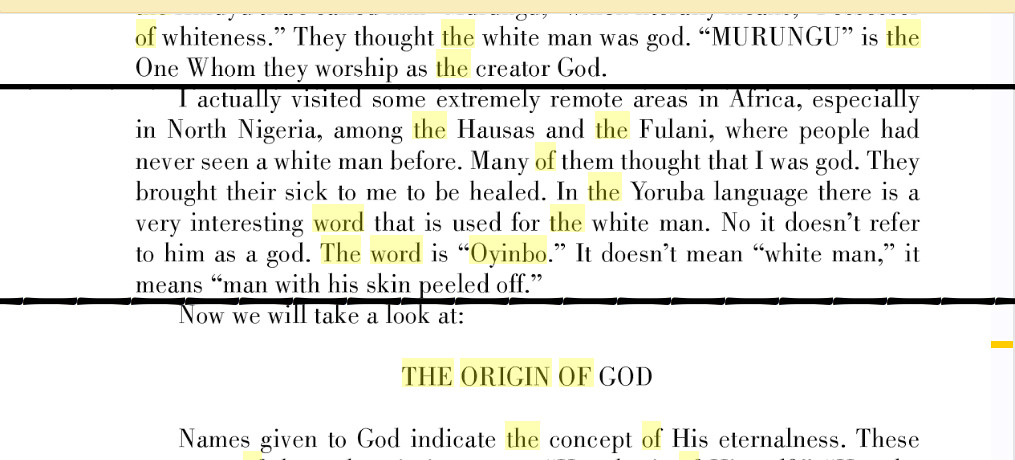 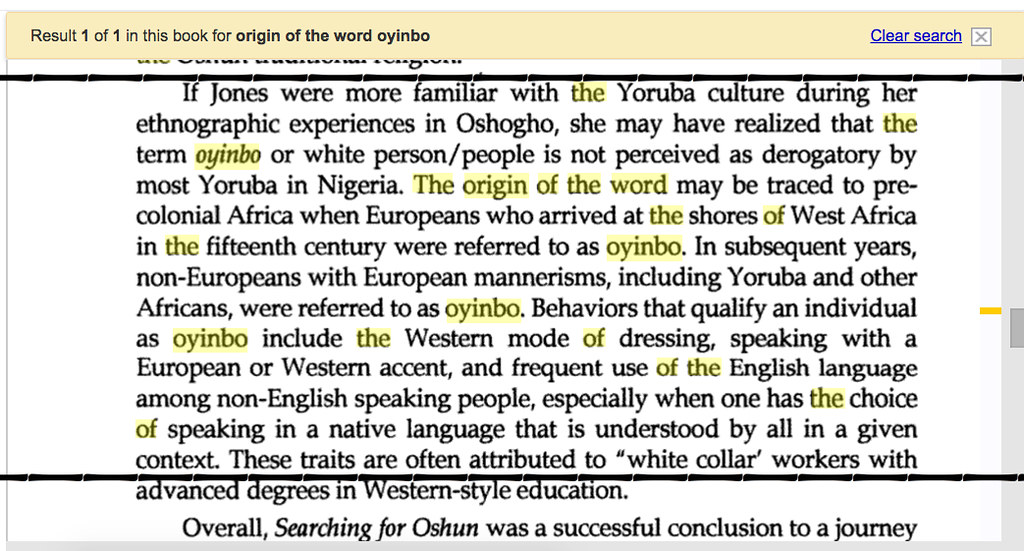  1 Like 1 Share |
| Re: Why Do Igbo People Claim Yoruba Words To Be Theirs? by YourNemesis: 1:39am On Sep 09, 2016 |
BigFrancis, igbo is the more nasal language to any neutral Observer out there, not Yoruba. Ordinary Omi becomes mmiri Eti becomes Nti Omo becomes Nwa or Nwo Mama or Iya becomes Nne Emi (me/mine) becomes simply a nasal mm Double n's and m's everywhere, nasalisation beginning words and all over the middle. The only difference is that Yoruba has words ending in visualizations, whereas as far as I am aware, Igbo does not. For example if an Igbo man wants to pronounce the Yoruba word for Bat "Adan" he would say 'Ada" or Horse 'Eshin" becomes Eshi. even names. Akin they say 'Aki" Ebun becomes Ebu.... so forth. 3 Likes |
| Re: Why Do Igbo People Claim Yoruba Words To Be Theirs? by bigfrancis21: 2:15am On Sep 09, 2016 |
YourNemesis: The consonant 'n' and the nasal n with a tilde on the top are two different consonants, at least in Igbo language. The usage of the ordinary 'n' consonant itself is not nasalization but the usage of the other one, ñ, lies the nasalization. Yoruba is quite a nasal language and pronunciation of many Yoruba words end with the nasal ñ sound such as 'gan', 'gbagaun', 'egungun', 'eyin', 'ebun' etc. In fact, the sound you make when say 'gan' in Yoruba, that is the nasal sound being referred to here, different from the one you make when you say 'n' as in 'una'. In Igbo, nasal sounds are present but to a much lesser extent than Yoruba and mostly occur at the beginning or middle of a word and rarely at the end, such as ñuo mmili (drink water), añuli (happinness as in the Igbo name Añulika - happiness is the greatest), añaa (some Igbo dialects say I mere añaa? - how do you do?) etc. and that is pretty much about nasalization in Igbo language. As a rule of thumb, 98% of Igbo words end in vowels and hardly in consonants except for a few words such as Odum (lion), Mahadum (University) etc. Some Igbo dialects tend to be nasalized when spoken such as Owerri or Ngwa dialects (for example, nke ahu, meaning 'that one', in standard Igbo becomes ke añhu in Owerri but notice the occurrence of the nasalization - in the middle and not at the end of the word) usually at the beginning or middle of a word never at the end but that's pretty much about it in Igbo language. Double consonants is not nasalization, both are 2 different features in the Igbo language. Igbo language makes a distinction between non-nasal 'n' and nasal 'ñ'. We also make a distinction between ordinary 'p' and double consonant 'kp'. You did corroborate that Igbos pronounce Yoruba nasal words without the nasalization such as 'Ebun' as 'Ebu', 'Adan' as 'Ada' etc. indicating the obvious lack of the nasalization feature in most Igbo dialects. Thus, Igbo language is not as nasal as Yoruba. It should be the other way round. 3 Likes 1 Share |
| Re: Why Do Igbo People Claim Yoruba Words To Be Theirs? by bigfrancis21: 2:21am On Sep 09, 2016 |
YourNemesis: Please provide the link to the source of these images. The date of publication of this article is of dire importance. 3 Likes |
| Re: Why Do Igbo People Claim Yoruba Words To Be Theirs? by YourNemesis: 2:28am On Sep 09, 2016 |
bigfrancis21: Francis, Nasal sounds are sounds which require the nasal cavity to be vocalised effectively. So when you say "ñuo mmili", there are actually Two nasal sounds in this phrase, not one. Just hold your nostrils and try to pronounce Mmili. The Yoruba equivalent is simply "Mu Omi". None. The rest of what you said I already explained. And that is the position of the occurrence of such nasal consonants. In Yorubas it can begin , be in the middle or the end. In Igbo it occurs in the Middle and Beginning. But in general, in an Igbo sample text, while I will cunt 25 nasal consonants, the same in Yoruba might have just 10. Write "I saw the woman's child with my very own eyes" in Igbo and let us compare same to Yoruba. |
| Re: Why Do Igbo People Claim Yoruba Words To Be Theirs? by YourNemesis: 2:36am On Sep 09, 2016 |
bigfrancis21: I closed those tabs, I will have to search for the terms that led me there again. But here is one other source. Here is a dictionary of the Yoruba Language (1852) 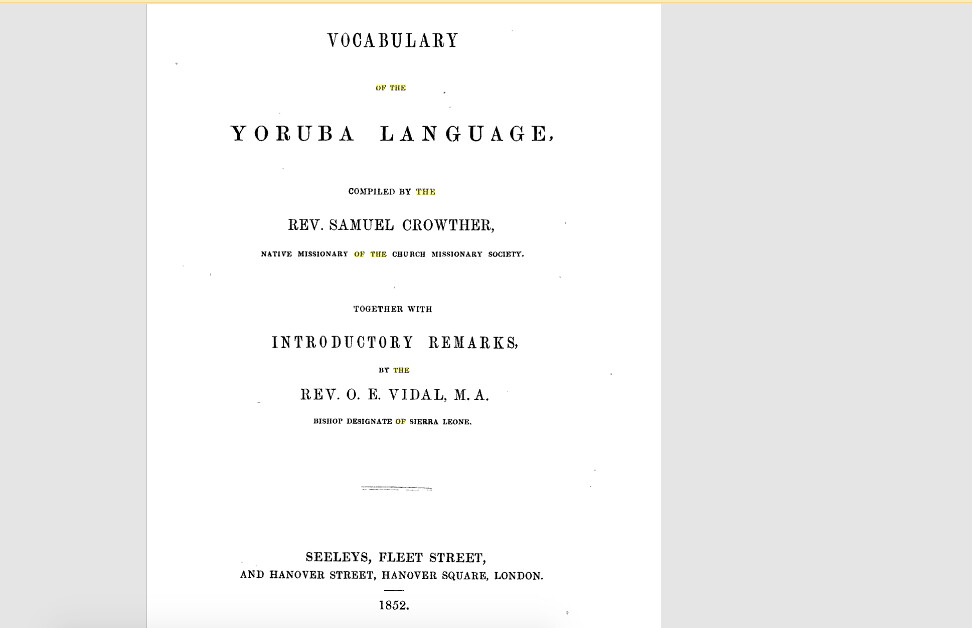 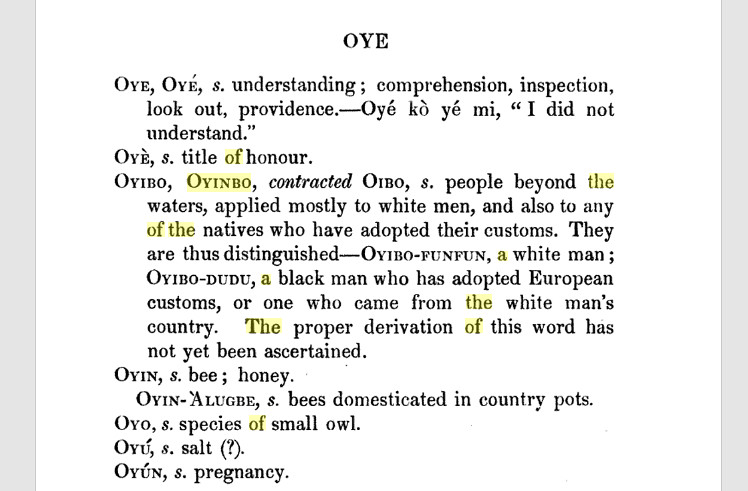 https://books.google.com/books?id=9qETAAAAQAAJ&pg=PA227&lpg=PA227&dq=Oyinbo+A+vocabulary+of+the+Yoruba+language&source=bl&ots=8lFNcx5eal&sig=62bgneTBHRKJloY4ABYOGAtYA6Y&hl=en&sa=X&ved=0ahUKEwiN_NzlkYHPAhUEGB4KHSAdB0UQ6AEIQTAG#v=onepage&q=Oyinbo%20A%20vocabulary%20of%20the%20Yoruba%20language&f=false |
| Re: Why Do Igbo People Claim Yoruba Words To Be Theirs? by bigfrancis21: 2:38am On Sep 09, 2016 |
YourNemesis: This argument you are making lacks any credibility because Igbo language makes a distinction between 'n', 'nw', 'ny' and ñ. The occurrence of ordinary 'n' isn't nasalization, whether it occurs in double consonants or not. When I pronounce 'mmili' or 'nmili' I do not nasalize it. Maybe you pronounce those words with nasalization, native to you already being a Yoruba. Words like 'Nneka' with double 'n' or 'Nnewi' etc are not nasal words and Igbos do not nasalize them when they pronounce them. Nasal sounds are sounds that flow from your nostrils or nasal glands during speech. In pronunciation, 'Nneka' and 'gan' are not the same thing. Attached below is an image of the Igbo alphabet indicating the differences in pronunciation of 'n', 'ñ', 'nw', and 'ny'.  As for your statement translated to Igbo, 'e jii m anya m naabo fu nwa nwayi afu' in typical Onicha dialect. There is no nasalization there to a native Igbo speaker, except you nasalize those words when you try to pronounce them - a typical feature in Yoruba language. 3 Likes |
| Re: Why Do Igbo People Claim Yoruba Words To Be Theirs? by YourNemesis: 2:45am On Sep 09, 2016 |
No it does not..lol First, How many nasal consonants/vowels does igbo have.... let us pick the discussion from there. |
| Re: Why Do Igbo People Claim Yoruba Words To Be Theirs? by YourNemesis: 2:50am On Sep 09, 2016 |
bigfrancis21: Let me bring out the nasawords out for you M -My Anya - Eyes Nwa - Child Nwayi - Woman All in all occurring in 5 places. Compare to. Mo fi oju ara mi ri Omo Obirin naa. Nasal words Obinrin - Woman Just 1. |
| Re: Why Do Igbo People Claim Yoruba Words To Be Theirs? by bigfrancis21: 2:51am On Sep 09, 2016 |
YourNemesis: Thank you for this. This article was written in 1852, compiled by Ajayi crowther. Olaudah Equiano wrote of Oyibo as far back as 1700s. The obvious deductions here are glaring for any neutral reader to see. More importantly, he admitted in his work that the origins of the Oyibo word had not yet been ascertained (or to be more precise, the origin of Oyibo is not of Yoruba origin) - he was not quick to conclude it was of Yoruba origin, Ajayi himself being well-traveled and had been to Igboland to observe the Igbos also using that same word. 7 Likes 1 Share |
| Re: Why Do Igbo People Claim Yoruba Words To Be Theirs? by bigfrancis21: 2:53am On Sep 09, 2016 |
YourNemesis: Lol. Those words are not nasal words. Quit with the folly already. Igbo is not as nasalized as Yoruba language. 3 Likes |
| Re: Why Do Igbo People Claim Yoruba Words To Be Theirs? by YourNemesis: 2:56am On Sep 09, 2016 |
bigfrancis21: Ok , are there proper academic, works that ascribe the origin of the words to Igbo language? If there are, what is the etymology of the word? Cause so far I have seen none. Your Olaudah's "Oye Ebo" example was a conjecture from you or others. 1 Like |
| Re: Why Do Igbo People Claim Yoruba Words To Be Theirs? by YourNemesis: 2:57am On Sep 09, 2016 |
bigfrancis21: Guy, do you know what nasal is? I doubt. |
| Re: Why Do Igbo People Claim Yoruba Words To Be Theirs? by bigfrancis21: 3:06am On Sep 09, 2016 |
YourNemesis: Read Olaudah's statement again. He not only dropped the oye-eboe word but also left the meaning of the word, thus making it clear what he was trying to say. There is no conjecture here. He used 'oye-eboe' to refer to 'red-skinned' men, thus leaving out any extraneous meanings whatsoever. I only go by what he wrote over 300 years ago. 2 Likes |
| Re: Why Do Igbo People Claim Yoruba Words To Be Theirs? by bigfrancis21: 3:07am On Sep 09, 2016 |
YourNemesis: Lol. I should be telling you that. |
| Re: Why Do Igbo People Claim Yoruba Words To Be Theirs? by YourNemesis: 3:41am On Sep 09, 2016 |
bigfrancis21: lord have mercy...lol Igbo does not have a contrast among voiced occlusives (between voiced stops and nasals): the one precedes oral vowels, and the other nasal vowels. Only a limited number of consonants occur before nasal vowels, including /f, z, s/. The graphemes ⟨gb⟩ and ⟨kp⟩ are described both as coarticulated /ɡ͡b/ and /k͡p/ and as implosives, so both values are included in the table. ........ many so called "adjectives" in Igbo are considered nouns, especially when the word is a pre-modifier like im ágádí nwóké transliterated as "elderly man". Igbo features vowel harmony between two vowels and commonly features vowel assimilation where a preceding vowel influences the articulation (or the elision with /a/) of the next such as in ǹk'â, "this one", analysed as ǹkè "of" and â "this". Igbo syllable shapes are CV (consonant, vowel) which is the most common, V, and N which are syllabic nasals These vowels also occupy different places in vowel space: [i ɪ̙ e a u ʊ̙ o ɒ̙] (the last commonly transcribed [ɔ̙], in keeping with neighboring languages). For simplicity, phonemic transcriptions typically choose only one of these parameters to be distinctive, either RTR as in the chart at right and Igbo orthography (that is, as /i i̙ e a u u̙ o o̙/), or vowel space as in the alphabetic chart below (that is, as /i ɪ e a u ʊ o ɔ/). There are also nasal vowels. Igbo is a tonal language with a high, mid, and low range, in addition there are rising and falling tones. Accents are used to indicate the high and low tones; an acute accent such as 'ó' are used for high tones, and a grave accent such as 'è' is used for a low tone. There are further accents that indicate nasal tones. The lower dotted accent such as 'ọ' combined with a grave accent ('ọ̀') is used to indicate a low nasal tone, and an upper dotted accent such as 'ė' or a lower dotted accent with an acute accent ('ọ́') is used for a high nasal tone. The trema (¨) such as 'ö' or a simple dot underneath is used for a mid nasal tone. Other diacritics include the caron (ˇ) for rising tones, the circumflex (ˆ) for falling tones, and the macron (¯) for long vowels.http://wikitravel.org/en/Igbo_phrasebook ỤDA ASỤSỤ (SOUNDS) The moment an Igbo person tells a non Igbo that there are no nasal sounds in a language with as many nasal phonemes as Igbo just to win an argument. 2 Likes |
| Re: Why Do Igbo People Claim Yoruba Words To Be Theirs? by lawani: 3:53am On Sep 09, 2016 |
YourNemesis: I beg leave the man. What will we not hear?. Igbos wey never see white man before are the ones who gave us our word for white man! Not worth debating. Igbos had no direct dealing with Europeans before Nigeria whereas Yoruba have known white people for thousands of years. Pls dont debate it with him anymore. He is not reasonable. 1 Like |
| Re: Why Do Igbo People Claim Yoruba Words To Be Theirs? by YourNemesis: 3:57am On Sep 09, 2016 |
bigfrancis21: Olaudah's usage of the word was NEVER used in reference to white people, but rather fellow Africans like himself. "Onye Igbo" or "Oye Eboe' as the case may be- in referring to neighboring populations (but not themselves) who were seen as Igbo and happened to have reddish skin. Some have said it was probably the Aros who were the chief igbo culprits in slave raiding. Now, what is the correlation between Europeans and the term Eboe which was simply the old European spelling for Igbo? and Onye/Oye meaning person? The people using this as an origin for the word are simply conjecturing. 1 Like |
| Re: Why Do Igbo People Claim Yoruba Words To Be Theirs? by bigfrancis21: 4:02am On Sep 09, 2016 |
YourNemesis: Lolll. I never said Igbo lacked nasal sounds. Infact I'll post my original post here again for you to read. I simply said Igbo language is not as nasalized as Yoruba language. The articles above you just quoted only corroborates my earlier statement and punches any weak line of argument of yours. bigfrancis21: I even gave you examples of words nasalized in Igbo. Did you read my post at all? Also, in the study of phonetics, languages often determine their nasal sounds depending on the uniqueness of the language. For Igbo, ñ is considered nasalization proper while in English, 'm' and 'n' are considered nasal consonants. ñ is to Igbo what 'ng' is to English i.e. singing, banging, etc. Meanwhile, translate this into Yoruba for me: that woman's child prepared the 20 long charms well for the Egwugwu masquerade. 1 Like |
| Re: Why Do Igbo People Claim Yoruba Words To Be Theirs? by bigfrancis21: 4:10am On Sep 09, 2016 |
YourNemesis: Well, Olaudah used the word to refer to 'red skinned' people, even though his people may not have had direct contact with Europeans but they definitely used it to refer to 'red skinned' people, which could be fellow Igbos or Europeans. Olaudah noted in his book that fair skinned Igbos were rare in his community thus anything close to yellow skin or red skin was called 'oyibo'. It does not have to be in reference to the white man, the usage and context of the word is the crux of the matter here. Olaudah's story is simply an isolated case of an Igbo community devoid of exposure to the Europeans that had oyibo in their lingua franca as of the 1700s. Another documented example is Ajayi Crowther and Christopher Taylor, a Sierra Leonean of Igbo ancestry, who were both referred to as 'oibo ojii' (black foreigners) by Igbo natives in the 1850s. Even in Igboland today, fair people are still called 'oyibo' or 'bekee'. 1 Like |
| Re: Why Do Igbo People Claim Yoruba Words To Be Theirs? by YourNemesis: 4:12am On Sep 09, 2016 |
bigfrancis21: LOL... Igbo is a very nasal language. Infact, one of the most nasal languages I have ever come across. Even though Among Igbo speech forms, there are others with extra nasalizations to even the Average Igbo such as Owerri and Ngwa, maybe those extra nasalization they have but which are absent in your own speech is what you think nasal sounds are. But to others, even the standard that claims to have "eliminated" all the nasality of the language remains pretty nasal. Here are nasal sounds in standard Igbo. 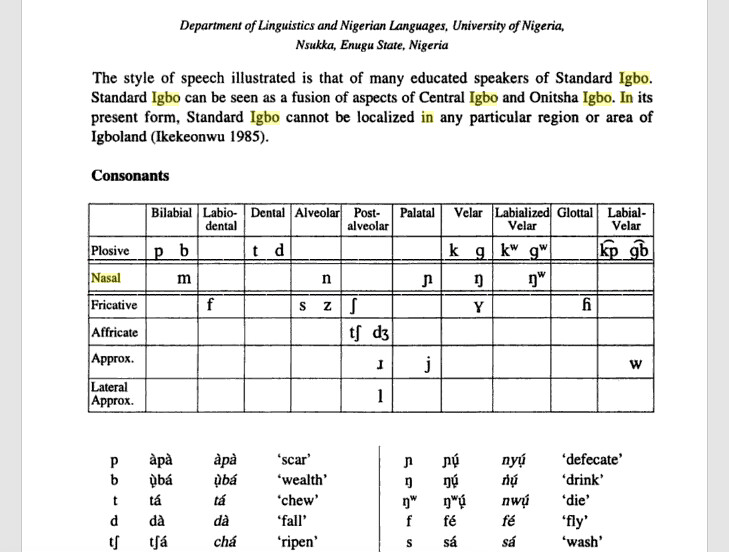 Stop flogging a dead horse. This case is closed. |
| Re: Why Do Igbo People Claim Yoruba Words To Be Theirs? by bigfrancis21: 4:19am On Sep 09, 2016 |
lawani: Lol. Igbos were dealing with the Europeans during the times of slave trade long before the introduction of Christianity through places along the delta such as Aboh Delta state, and through the ports of Calabar, Bonny and Opobo where tons of Igbos and Igbo slaves had settled and dealt directly with the Europeans, often acting as middlemen between the Europeans and the Igbo hinterland. Initially, the Ijaws acted as middlemen between the Igbos and Europeans but in a short while, Igbo settlers along the mouth of ND dealt directly with the Europeans. Do not make blanket statements you cannot prove. It is well documented that several European groups preferred certain African ethnic groups to the others. The British preferred Igbos, Angolas, Congolese etc., and the Portuguese preferred the Fons, Gas, Yorubas, Akans etc. This explains why Igbo, Angolan and Congolese slaves were more common in English speaking countries today (former British colonies) such as Jamaica, USA, Barbados, Belize, Guyana, St. Vincent, St. Kitts etc. and Yoruba slaves in Portuguese/Spanish countries such as Brazil, Cuba, etc. Notwithstanding, Igbo slaves were also present in non-English speaking countries (Haiti, Cuba, Brazil etc.) , but to a lesser extent than their counterparts from the Bight of Benin. 3 Likes |
| Re: Why Do Igbo People Claim Yoruba Words To Be Theirs? by YourNemesis: 4:24am On Sep 09, 2016 |
bigfrancis21: Are you trying to tell me that the 'oye - eboe' Ekwuano talked of was not the far more reasonable "onye igbo" but instead, a rather far fetched European person .... If oyibo /oyinbo is from oye - eboe, how does any of the constituent terms mean a caucasian or white person? Onyeocha , I can clearly see. Even "bekee" which was derived from the name of a popular European explorer..... I can see as well. |
| Re: Why Do Igbo People Claim Yoruba Words To Be Theirs? by bigfrancis21: 4:27am On Sep 09, 2016 |
YourNemesis: Lollll. This man lacks comprehension abilities.  I told him Igbo language is nasalized (and some dialects are well nasalized such as Owerri and Ngwa) but not as Yoruba language, yet he keeps bringing out evidence that says it is nasalized, just as I said before. Oh Israel, what breed of Nigerians do we have today. I told him Igbo language is nasalized (and some dialects are well nasalized such as Owerri and Ngwa) but not as Yoruba language, yet he keeps bringing out evidence that says it is nasalized, just as I said before. Oh Israel, what breed of Nigerians do we have today.  http://www.africa.uga.edu/Yoruba/phonology.html Funny he has not furnished evidence that proves Igbo is more nasalized than Yoruba language but articles list Yoruba among nasalized languages in the world.
Please keep providing evidence that support my earlier position. Keep them coming. You're only helping to buttress my points.  2 Likes |
| Re: Why Do Igbo People Claim Yoruba Words To Be Theirs? by bigfrancis21: 4:30am On Sep 09, 2016 |
YourNemesis: Well, going by what he wrote, he said his people used 'oyibo' to refer to red-skinned people from a distance. That is the crux of the matter here. Any conjectures you make out of it are at your discretion. 2 Likes |
| Re: Why Do Igbo People Claim Yoruba Words To Be Theirs? by bigfrancis21: 4:36am On Sep 09, 2016 |
By the way, you clearly dodged rendering that statement in Yoruba as I had requested.  I am waiting for you to translate that statement to Yoruba. I am waiting for you to translate that statement to Yoruba.Here is the statement again, this time read it slowly and carefully and give me the translation. I am waiting. That woman's child prepared the 20 long charms well for the Egwugwu masquerade. |
(1) (2) (3) ... (9) (10) (11) (12) (13) (14) (Reply)
I Am Dominican From Dominica Republic... ASK Me Anything. / Juju/black Magic In Nigeria - Blood Money And Spiritual Attacks / Ooni Of Ife Oba Ogunwusi Finally Marries Fourth Wife, Set To Marry 5th(pictures)
(Go Up)
| Sections: politics (1) business autos (1) jobs (1) career education (1) romance computers phones travel sports fashion health religion celebs tv-movies music-radio literature webmasters programming techmarket Links: (1) (2) (3) (4) (5) (6) (7) (8) (9) (10) Nairaland - Copyright © 2005 - 2024 Oluwaseun Osewa. All rights reserved. See How To Advertise. 112 |